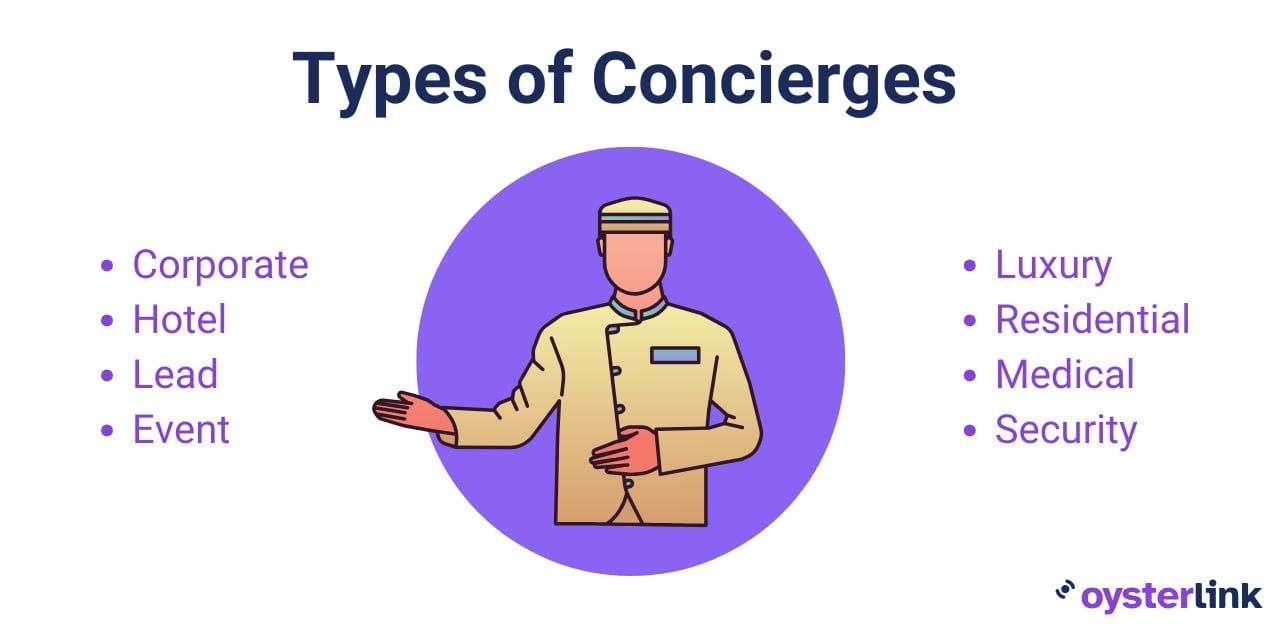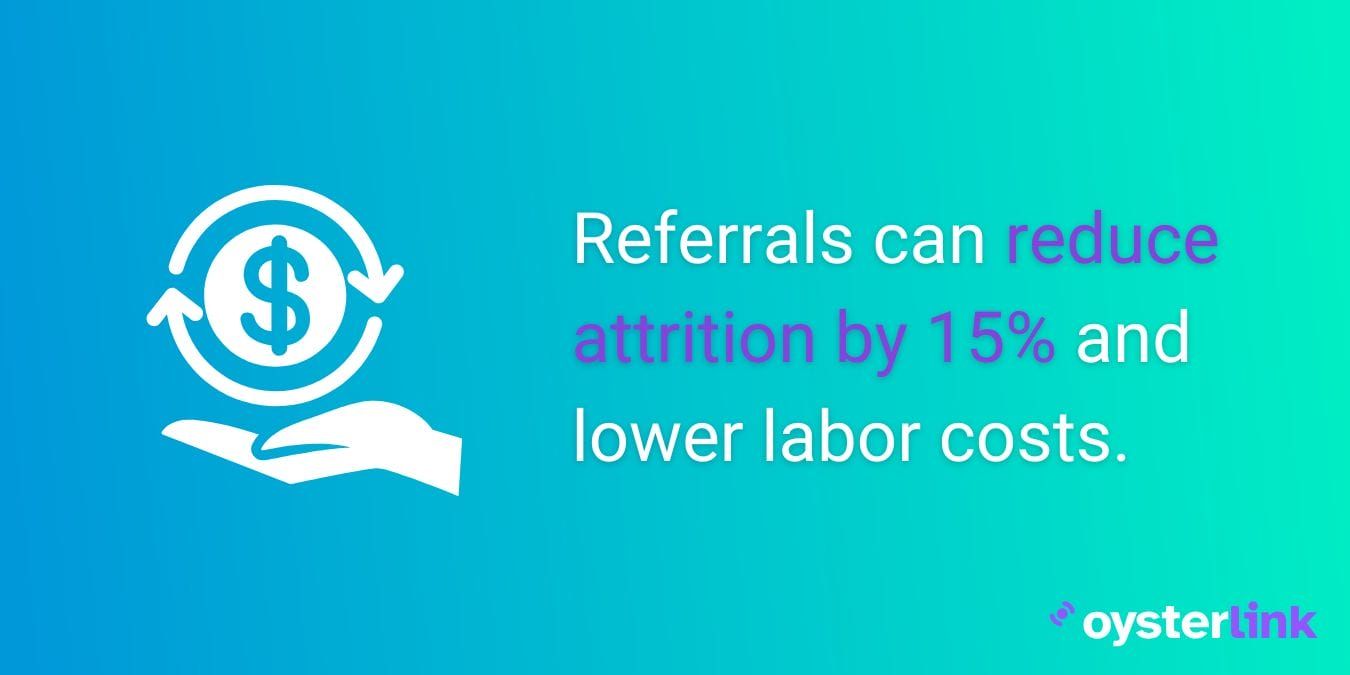How to Hire a Concierge: Key Findings
- Referrals reduce employee turnover by 15%, making them one of the most effective ways to hire reliable Concierges.
- Full-time Concierges are best for high-demand settings, while part-time hires are a cost-effective option for occasional or lower-volume needs.
- There are eight distinct types of Concierges, each with unique responsibilities depending on the work environment.
In this article, we’ll guide you through everything you need to know about how to hire a Concierge. We’ll help you ensure you find the right professional to meet your business needs whether it’s for a hotel, a corporate office or a residential building.
How To Hire a Concierge: Know What Type You Need
While their core responsibilities remain consistent, a Concierge’s duties may vary significantly depending on their workplace or role level. Below, we outline eight types of Concierges to help you decide which one is best suited for your needs.
Corporate Concierge
A Corporate Concierge works in office environments. They handle tasks such as receiving and distributing packages, scheduling appointments and providing information about the company’s services or offerings.
Hotel Concierge
A Hotel Concierge’s responsibilities include scheduling transportation, booking reservations for dining and offering recommendations for local attractions and activities.
In addition to fulfilling guest requests, Hotel Concierges also address complaints and resolve issues to ensure guests have a memorable experience during their stay.
Lead Concierge
A Lead Concierge supervises a team of Concierges, overseeing the quality of service provided and ensuring all guest needs are met. They often handle the most complex requests, manage scheduling and train new team members.
Event Concierge
An Event Concierge specializes in coordinating events, whether for corporate functions or private occasions. Their responsibilities include managing guest lists, arranging transportation, booking venues and ensuring that all logistics run smoothly.
Luxury Concierge
A Luxury Concierge caters to high-net-worth individuals and VIP guests at five-star hotels and resorts as well as upscale residential buildings. There, they handle tasks like booking luxury accommodations, securing reservations at top restaurants and providing access to exclusive events or experiences.
Luxury Concierges excel at anticipating their clients’ needs and delivering exceptional service.
Residential Concierge
A Residential Concierge works within residential buildings, apartment complexes or private communities. Their duties include arranging housekeeping, scheduling maintenance and coordinating social events or community activities.
Medical Concierge
A Medical Concierge specializes in healthcare-related services, assisting patients with scheduling medical appointments, arranging transportation to healthcare facilities and ensuring they have access to the appropriate medical resources.
They may also coordinate care for patients who need long-term medical attention or specialized services, making the healthcare experience more convenient and less stressful for patients.
Security Concierge
A Security Concierge combines Concierge duties with a focus on safety and security. This role typically exists in high-security environments such as gated communities, luxury buildings and corporate or government offices.

Decide if You Need To Hire a Part-Time or Full-Time Concierge
When deciding whether to hire a part-time or full-time Concierge, consider the scope of tasks, the level of service you need and your budget. Both options have their advantages depending on the demands of your business or lifestyle.
Full-time Concierge
A full-time Concierge is ideal for those requiring consistent, daily support. This makes it a great choice for high-net-worth individuals with complex needs, large companies supporting executives or luxury hotels with high guest service expectations.
Part-time Concierge
A part-time Concierge is a more cost-effective option for those who don’t need round-the-clock assistance. This arrangement works well for individuals or businesses with occasional needs, such as managing travel arrangements or handling tasks during peak times.
Things You Should Look for When Hiring a Concierge
Concierges typically don’t need a diploma or prior work experience to start in the role. However, candidates with years of experience and relevant certifications are often preferred for prestigious five-star hotels or high-profile clients.
While specific requirements vary depending on the establishment, certain core skills and qualifications are essential for success in any Concierge position.
Below, we’ve outlined some of the most important skills, qualifications and experience a Concierge should have:
- Excellent customer service experience
- Familiarity with booking and reservation systems
- Excellent written and verbal communication skills
- Proficiency in booking and reservation management software
- Strong organizational, time management and multitasking skills
- Ability to work well with others
- Attention to detail
- Discretion and confidentiality
- Problem-solving and critical thinking
- Cultural sensitivity
Write an Effective Concierge Job Description
Be specific when describing the work environment. Clearly outline in your job description whether the role is based in a high-end hotel lobby, a corporate office or an events company.
Some candidates may prefer the structured setting of a corporate office or five-star hotel, while others thrive in faster-paced environments like those in events companies. Transparency about the work environment ensures you attract the right fit for the role.
It’s equally important to clarify key responsibilities and the people they’ll collaborate with.
For example, a Hotel Concierge focuses on guest interactions, hotel management and external service providers, while a Corporate Concierge supports employees and management with tasks like scheduling and event planning. An Event Concierge, however, works closely with vendors, planners and clients to manage logistics under tight deadlines.
This clarity helps set expectations and attracts candidates best suited to the environment.
Identify Places Where Can You Find Qualified Concierges
Consider combining offline and online job posting methods to help you attract qualified candidates.
Place a ‘Help Wanted’ sign in your window
This method is especially effective for businesses with high foot traffic, such as hotels and resorts. Passersby interested in the job can easily spot the opening and apply directly. It’s a traditional approach but remains highly effective, particularly for local, entry-level positions.
When placing a ‘Help Wanted’ sign in your window, include essential details like an email address for applicants who prefer to send their applications online.
Ask for referrals
Referrals are one of the most reliable methods for finding a qualified Concierge, reducing attrition rates by 15% and significantly decreasing labor costs. Attrition rate refers to the percentage of employees who leave a company over a specific period, either voluntarily or involuntarily.

It’s another traditional or offline method that businesses rely on to find trustworthy and competent candidates. Referrals often lead to candidates who are a better cultural fit because they come recommended by someone already familiar with your work environment.
Post on your social media page
Your organization’s social media platforms like LinkedIn, Facebook and Instagram offer excellent opportunities to engage a wide audience.
These platforms allow you to connect with potential candidates directly and use paid advertising that can target individuals based on location, experience and interests.
Sharing job posts on your social media pages also taps into your network of followers, which might include qualified candidates or people who can refer someone suitable.
Use job boards
Post your job openings on both general and niche-specific job boards to attract a diverse pool of candidates. Websites like Indeed, Glassdoor and ZipRecruiter can help you reach job seekers from various industries, including those considering a career shift to the hospitality sector.
To target candidates specifically interested in hospitality roles, consider using OysterLink. OysterLink offers AFFORDABLE job postings and useful free resources, such as customizable job descriptions and interview questions for over 30 positions within the hospitality industry.
Interview Tips for How To Hire a Concierge
Focus on more than just general qualifications. Your goal is to ensure that the candidate has the right skills and mindset to handle the specific demands of the role.
A well-structured interview process that incorporates general questions, skills and experience questions and situational questions will give you a comprehensive understanding of a candidate's suitability.
- General interview questions: These assess the candidate’s background, motivation and overall fit for the role. Ask about past experience, interest in the Concierge position and knowledge of your organization.
- Skills- and experience-based questions: These evaluate specific abilities like customer service and problem-solving. Ask how they’ve handled multiple guest requests or worked under pressure.
- Situational questions: These explore how candidates respond to real-life challenges. Present scenarios like managing a difficult guest or juggling competing priorities to assess their approach.
For additional guidance, check out our Top 30 Concierge Interview Questions.
What To Do After You Hire a Concierge
Once you’ve chosen the right candidate, send a job offer that outlines the role, pay, start date and how to accept. After they accept, begin onboarding by providing a welcome packet, handbook and necessary tools like uniforms or software access.
Introduce your new Concierge to key team members and give them a tour of the workplace, especially if they’ll interact with guests. Follow up with role-specific training, job shadowing and clear explanations of company policies.
Keep communication open in the first few months. Regular check-ins help address concerns, build confidence and support long-term success.
How To Hire a Concierge: Final Thoughts
Hiring the right Concierge comes down to understanding your business needs, writing a clear job description, and using the right platforms to find qualified candidates. Whether you're hiring for a hotel, corporate office or luxury residence, a strong interview process and thoughtful onboarding help ensure a lasting fit and high-quality service.











Loading comments...